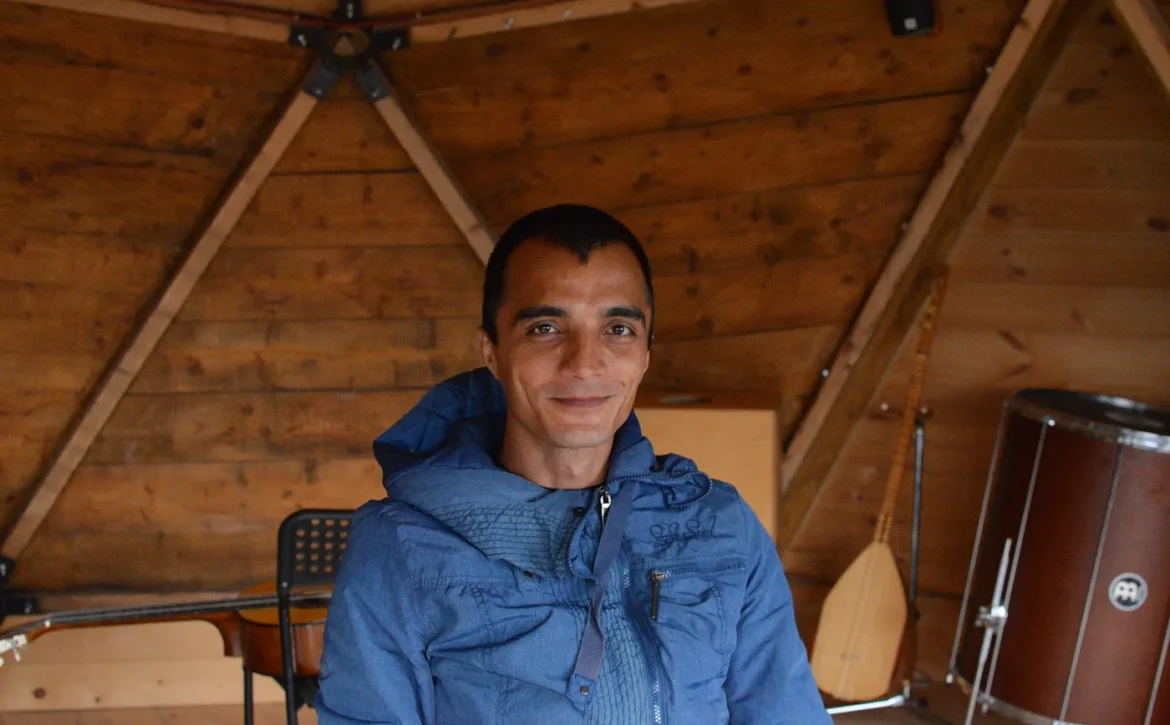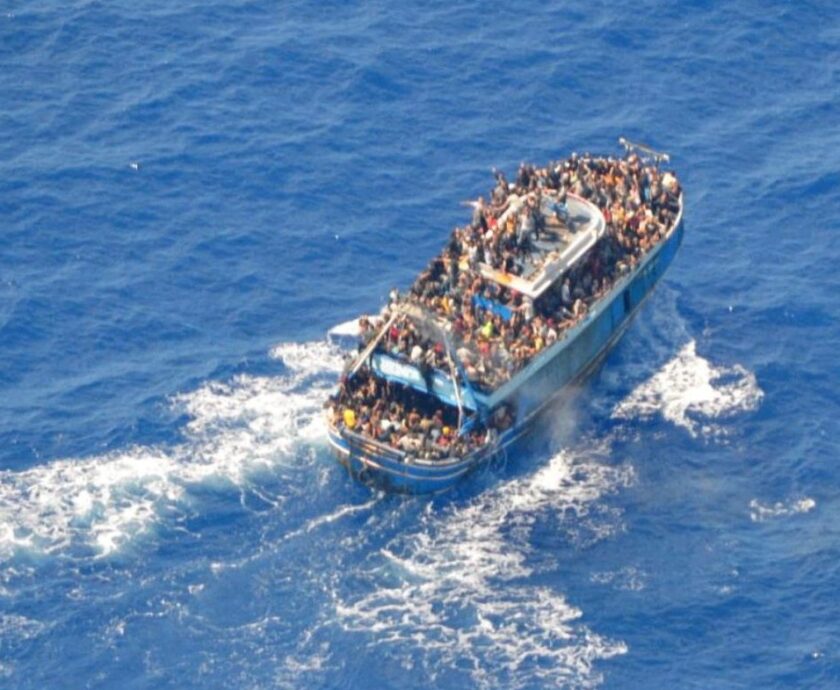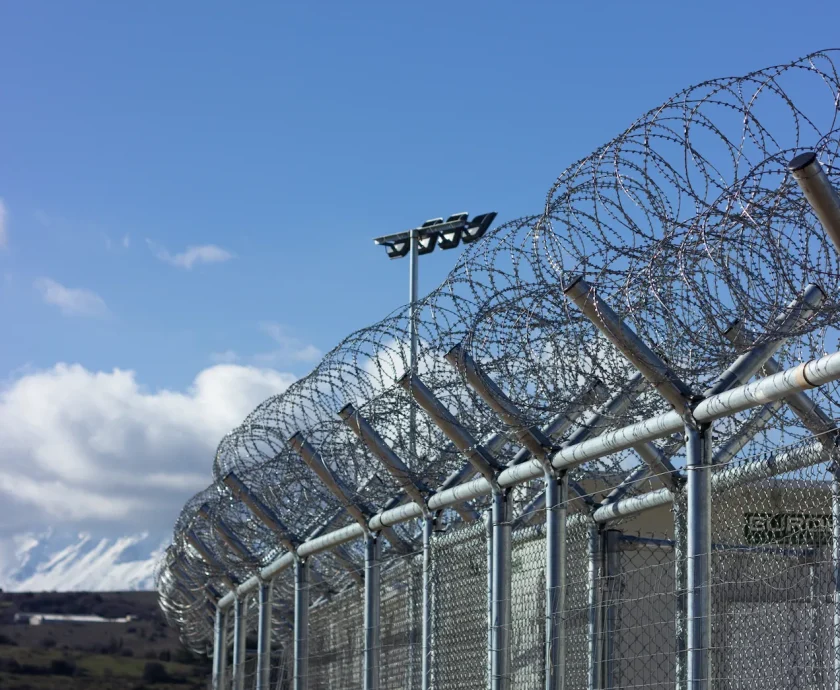
Violence and survival: On the frontlines of the Greek asylum system
Naser Rahimi says he knows ‘a little’ about survival but this is, in many ways, an understatement. Sitting down for an interview in Northern Greece, Naser shares how he escaped Afghanistan to find sanctuary in Europe. His experiences, both on the move and in the Greek asylum system, suggest his knowledge of survival is, in fact, extensive.
A trained carpenter, Naser is driven by a desire to share his skills. He explains how he had opened a woodworking shop shortly before leaving Afghanistan. “I wanted to help people and contribute the skills I have to society,” he said.
Yet Naser’s venture was short-lived. Following the Taliban takeover of Afghanistan in 2021, humanitarian and economic conditions became increasingly unbearable. By early 2022, the situation had reached breaking point — Naser left his family and his business to journey on foot through Pakistan, Iran, and Türkiye.
Surviving the journey
In Istanbul, Naser meets five men who also wish to cross into Greece. Together, they hike through Türkiye and cross the Maritsa River by boat.
At one point, their feet grow weary and the group stops to recover their strength. But, their peace is short-lived. A plain-clothes police officer appears before them, threateningly wielding a stick. Naser scrambles to up, his bag forgotten. The five men scatter, two colliding in their haste.
Fleeing the angry shouts of the policeman, Naser makes for a large drain pipe under a nearby highway. Inside, bees swarm angrily about his head, but this is by far preferable to the outside dangers. He looks back. Two other men follow him further into the tunnel, but the others are not. Naser sees them firmly in the policeman’s grip — there is nothing to be done.
The three men run and run. For hours they move further from arrest. But with their backpacks lost and their food supplies dwindling, they are no closer to safety. For six days, they walk through the mountains with no clear path to follow. Their food runs out, leaving them nothing but water.
Naser is fading; one of the other men is ready to give up. At this point, Naser pauses his story and pulls a phone from his pocket. He shows us a grainy video of a turtle and explains that he had asked his friend whether or not he would eat its meat. “When he replied to me, he said that if it were poison, it would not matter. All he wanted was to eat,” Naser recalls.
Taking a lace from his shoe, Naser kills the turtle. “I asked forgiveness so many times from my god and the turtle, apologising for this cruel action. But when we ate it, I felt at least that I didn’t waste the meat of that poor animal.”
Naser continues his journey, but his companions change. After a few days, he finds himself alone, with just a power bank, a mobile phone, and a small amount of money. He is exhausted, so exhausted, in fact, that he barely registers a pain in his foot. Determined, Naser keeps walking.
Ever so precisely, almost as if preparing for an asylum interview, Naser recounts the remainder of his journey. He knows dates; he knows times. He shares that just 30 minutes from the Albanian border, he fell.
Naser stumbles down the mountain on his bleeding foot. He uses his last droplets of strength to call the Albanian health service which refuses to collect him, telling him instead to contact their Greek counterparts. He makes a tourniquet for his leg, pours salt on his bleeding foot, and waits.
Leaving Afghanistan, Naser knew his journey would be long. He was forewarned of the violence he would face crossing the border from Türkiye; he expected to feel pain, but he was undeterred. He was determined to reach safety inside the European Union. So, when he was finally rescued from the mountains by Greek medical workers, Naser thought his hardships were over. But he was wrong — he had yet to encounter the Greek asylum system.
Violent displacement
Naser is far from alone. Whether internally or internationally, more than 85 million people around the globe are currently displaced. That’s the same as if the entire populations of both the United Kingdom and the Netherlands were forced from their homes.
So what’s driving so many to flee their countries? The answer to this question is never simple. Movement is not a choice made easily, but more likely due to a well-founded fear of persecution. The words ‘political instability’ seem clinical, far-removed and devoid of compassion. ‘Persecution’ may be accurate under the Geneva Convention, but also fails to convey the true human horrors of war. Afghanistan. Somalia. Ukraine. Syria — these are but a few places where life has been turned on its head with the most devastating of consequences. Here — as in countless other locations — war, violence and terror cannot be neatly summarised in a definition.
A slower form of violence is also at play. The world’s changing climate is a looming, whirring threat, growing constantly closer, louder and more severe. With each year that passes, more of us are forced to admit that our homes are no longer hospitable. Changing rainfall patterns, more frequent and severe extreme weather events and extended droughts can be serious factors in a decision to move. Given the global situation it is alarming, if not altogether surprising that in 2024, 4 percent of the world’s population will likely need humanitarian assistance.
It seems the height of injustice that — at this time of intense need — many governments are responding with deterrents, detention, and a criminalisation of humanitarian aid. Addressing this concerning trend, UN Special Rapporteur, Mary Lawlor observes that the Greek government approaches migration in terms of security and prevention, rather than humanitarian relief. “What this has fostered for refugees, asylum seekers, migrants and the human rights defenders acting in solidarity with them, is an atmosphere of fear — particularly a fear of criminalisation,” she said in a 2022 press release.
Surviving the system
Manon Louis is an Advocacy Officer at Mobile Info Team, the human rights NGO. She works with people as they navigate the Greek asylum system, supporting them to make claims. She describes the process by which people can claim asylum in Greece.
First, people must endure 25 days of mandatory detention in a Registration Identification Centre while their case is processed and their identity proven. It can be longer — Manon has worked with people who have been detained for more than a month.
A mandatory detention period is unlawful in both the EU and in Greece. It violates Article 8 of the European Reception Conditions Directive under which Member States shall not ‘hold a person in detention for the sole reason that he or she is an applicant for international protection.’
A person who fled Afghanistan, and wished to remain anonymous, never received a proper explanation as to why they were detained in 2019. They said: “In Igoumenitsa, we were put in prison for two months and four days because we didn’t have any legal papers for Greece. I asked them so many times, ‘What is going on?’”
Following their release from detention, our source was instructed to claim asylum in Perama on the island of Corfu and sent to live in Katsikas camp in Ioannina. However, if a person is deemed ineligible for asylum or considered a risk to natural security, they will be transferred to a Pre-deportation Detention Centre.
When Naser arrived in Greece, he spent eight days in a hospital where surgeons put metal plates in his leg. After recovering from his operation, he recalls his first confusing interactions as he tried to claim asylum at a police station. “They took my fingerprints and gave me papers written in Greek. I was told to go to Igoumenista,” Naser said.
Naser slept in a park in Igoumenista and was not allowed to go back to the hospital. When he returned to the police station to ask for help, he was driven in a van to the bus station and told to go to Ioannina. Naser had no money for a ticket, but a man offered to pay for him.
Arriving in Ioannina, Naser went straight to the police station. “I was told I was not allowed to be in this city and that I must leave Greece in the next eight days,” Naser said. Unable to read Greek, he had not understood this information from his police papers.
“I was a broken-hearted person,” Naser said. “I felt so helpless and alone that as soon as I was outside the police station, I lay down on the floor of a cafeteria.”
After some time, a man approached Naser.
“Are you Afghani?” he said.
Naser could not hold back his tears as the man told him of the Katsikas camp and helped him to buy a bus ticket. Yet, when he arrived the camp denied him entry. “That’s when I came to Habibi.Works,” Naser said.
Digital asylum
An EU Directive stipulates that every asylum seeker should be granted ‘an effective opportunity to lodge [their application for international protection] as soon as possible’. Until November 2021, the Greek Asylum Service (GAS) operated a Skype registration system to meet this requirement.
Equal Legal Aid warns that digital asylum systems, including the Skype service, can prevent and delay people from claiming their legal right to asylum. These platforms are not equipped for vulnerability screenings which means victims of torture, minors and those with medical conditions do not receive the support and access to services they need.
Despite its challenges, the Skype system was relied upon. So, when it closed unexpectedly, it left many people in a state of limbo. “No one expected it at all, it was just completely shut overnight,” Manon said.
It took more than seven months for the GAS to provide a replacement. On 13th July 2022, the Ministry of Migration and Asylum launched an online platform through which asylum seekers arriving in Greece could electronically register themselves. Like the Skype system, it requires a phone, a regular internet connection and a degree of digital literacy.
The digital platform does not offer services in all necessary languages. For example, it provides no French translation which poses a serious barrier for those applying for asylum from the Democratic Republic of Congo and Cameroon.
First, applicants must fill out a form with their personal information. While it is not mandatory, applicants can also include whether they have a police note or a passport. Once this form is completed, applicants are invited to select one of the two possible registration facilities: the town of Diavata in Thessaloniki or Malakasa in the municipality of Oropos, north of Athens. While in 2022 Ukrainian refugees received a free KTEL bus ticket to make the trip, there was no financial assistance available for other people seeking refuge to make this journey.
The system offered its first appointments in September 2022. But just six weeks later, Mobile Info Team reported a near-total lack of appointments. Manon explained how unusual it became to secure an appointment within six months. Often the site simply stated: ‘no appointments available in this location’.
When people did manage to secure an appointment, the waiting times could be long. “There were people who were getting appointments, but in November 2023. So until then — despite being considered an asylum seeker by law — nobody knew if they were protected or not,” Manon said.
An absence of timely asylum services forces people to remain undocumented. Online applications do not provide physical documentation with which people can prove their status if questioned by Greek officials. This places people in positions of precarity, at higher risk of police apprehension and even pushback — that is when a person is forcibly returned to the country from which they fled.
Manon shared that Mobile Info Team has already received requests for support from people who experienced exploitation due to the lack of information on the digital asylum system. Some had been charged €150 by people offering to help them fill in the application form which in reality only takes five to ten minutes.
Surviving the limbo
Naser’s first — and most vulnerable — days in Greece had been marked by extreme misinformation and misunderstanding. Eventually, he was able to move from Ioannina to the Filipiada camp near Arta. “I knew no one and memories of my family moved in front of my eyes,” he said.
Naser got lucky with his registration appointment. Unlike some of the cases described by Manon, within a month he secured a date to register as an asylum seeker. “I am so thankful. I’ve been through so many difficulties so now I’m happy that I have reached a place where I can be relaxed; where I can be comfortable,” Naser said.
Approximately 16 months since he arrived in Greece, Naser’s legal limbo ended. At the end of February 2024, Naser moved from Greece to start a new life in Switzerland. But as the EU’s new Pact on Migration progresses through Parliament, extended periods of legal limbo seem increasingly certain.
The new Pact — intended to more evenly distribute responsibility for asylum seekers among EU countries and limit movement within the EU — proposes stricter screening at Europe’s borders.
As is already happening in Greece, people would be detained during a pre-screening process. The Pact says it would aim to process each application within 12 weeks, during which time a person’s fate will be sealed: either they can continue to claim asylum in the EU or they will be sent to a different country.
Research into the impacts of detention reveals severe, negative consequences for a person’s mental health. Studies consistently show people seeking refuge to be at higher risk of mental ill-health, especially depression and PTSD linked to experiences of torture and human trafficking.
These risks can be exacerbated when asylum cases are prolonged. According to the Helen Bamber Foundation, the ‘time spent in immigration detention in a host country is a particular stressor because it entails both loss of liberty and the threat of forced return to the country of origin.’
Our anonymous source, who experienced detention for more than two months, found this period indescribably challenging. “I faced many difficulties mentally. I was not well there [in detention]. And I was not comfortable. I was afraid during the night — there wasn’t any light. And for me, it just seemed like a zoo. It was a cabin and out of the cabin, there was a cage that you just can move and see around but you are not free to go here and there.”
The final vote on the new EU Pact of Migration is scheduled to take place in April 2024. It is expected to pass.





